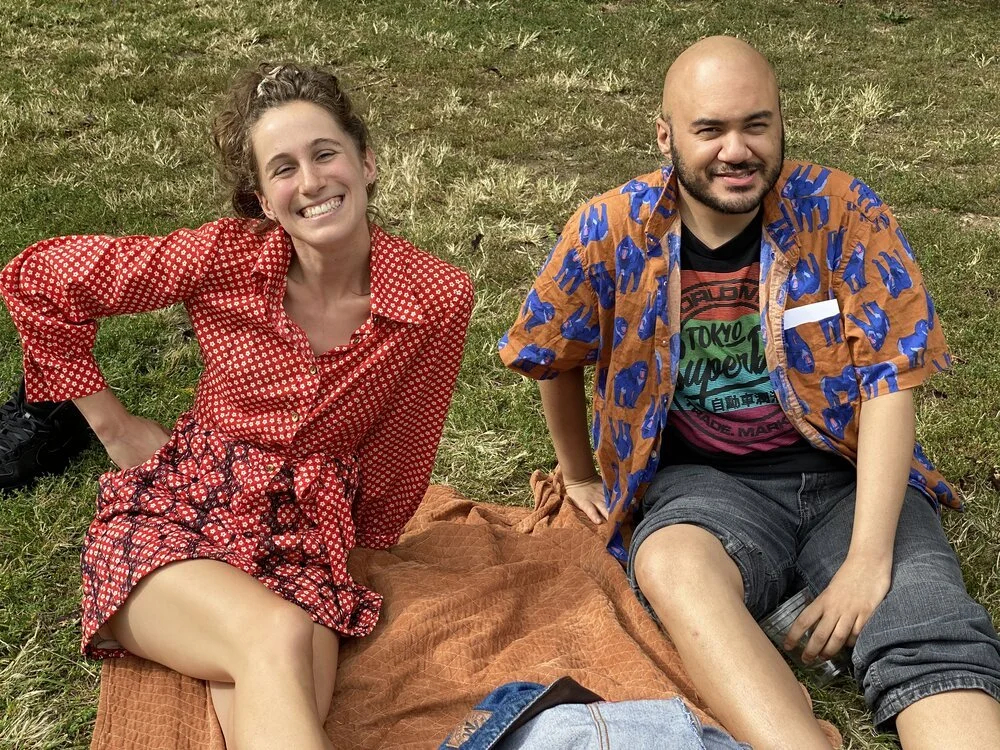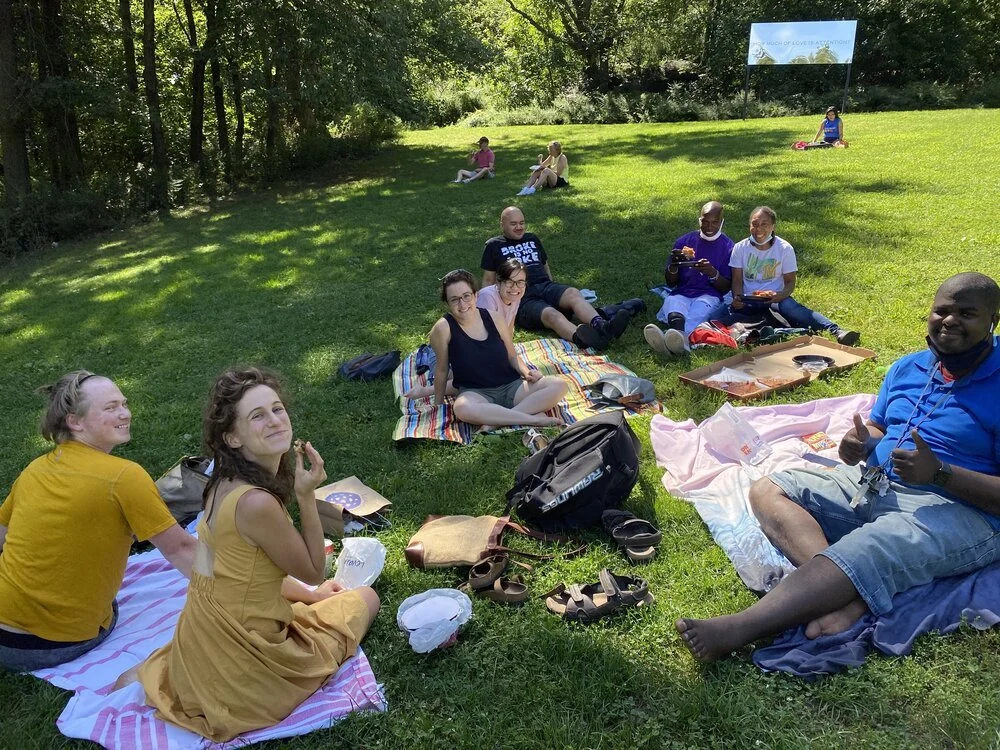Portrait of a Friend
by Sarabeth Weszely
Just a couple days ago, Lenny and I were walking home from a Do For One picnic together when we heard someone yell after us. Whatever they said was indiscernible to me, but I heard someone respond, “no, they’re just friends.” When I asked Lenny if he’d heard what they said, he told me, “they asked if you work for me.” I laughed, so as to say no, and so did he as he said in the warm stutter I’ve grown accustomed to – which bursts after a short frustration like toothpaste from the tube– “yeah, you wish.”
Lenny lives in a group home ten blocks north of me, which he shares with a handful of male roommates and rotating staff members. This is where my boyfriend Jesse and I come every time we’d like to see him. We stand in the red doorway with its seasonal décor and fill out paperwork for contact tracing, and then we go wherever we go, Lenny’s eyes moving between our faces and hands and the low horizon of the sidewalk while he speaks.
Do For One picnic in Central Park
My story of entry into the Do For One community is entangled with many things. I came to New York on a whim the fall after I graduated college. The day I arrived, I sat for hours on the stoop of a perpetually-closed corner fish shop called ‘Elias’s’ with my duffel bag and guitar case, just a stone’s throw from where the M60 bus drops you off on its way from the airport to Manhattan. I sporadically checked the cost of an Uber, which was about $7, as I waited for the woman from the classified ad (whose room I was renting) to pick me up in her car, which she insisted on doing even as she ran hours behind schedule.
I didn’t have a job or anyone I was visiting. I came with the ambiguous goal of establishing roots in a place where I could still feel like a traveler, romanced by the anonymity of seeing an entirely new train-full of people each morning and hoping to somehow find a community to ground me in its midst. It’s loneliness that made me come to this city and loneliness that made me stay. There are a lot of ways you can describe loneliness, and I’m not talking about all of them, though I’m sure I’ve felt most. The feeling that made me stay was a soft kind of loneliness, the kind that makes you low and joinable.
“It’s loneliness that made me come to this city and loneliness that made me stay.”
— Sarabeth Weszely
During my first couple of weeks, I put applications in at just about every open restaurant in Queens and Manhattan I could walk to. I started and stopped a few quick jobs at places Iike PJ Clark’s and Redeemer’s kids’ church set up crew (a curveball in the job-hunt which made for some very early Sunday mornings) and I eventually ended up serving at a nice restaurant in the West Village. Nestled in that chaos was the late Saturday night I met Jesse, after which I didn’t sleep at all until my alarm rang for kids’ church, jittery the whole day with romance and anxiety and a dancing, open loneliness.
The following fall, Jesse and I met Lenny at the first gathering for the West Harlem Do For One community, which Jesse had been a part of starting during our summer break up. Lenny made his introduction by asking what we were going to dress up as for Halloween, and when I told him I didn’t know yet, he suggested I take advantage of a convincing resemblance and go as Misty from Pokémon. When we asked in return what he was going to be, he said he didn’t know either. A few days later, we got an email with no subject: I am going to be wonder bread.
On Halloween, we waited as usual in his doorway, where a part-time worker we’d grown familiar with was preparing fish with gloves on. Lenny emerged from his bedroom in a polyester sack of wonder bread that came over his head like a hood and had side pockets for him to fill with candy. We walked through cold and rainy Harlem, collecting candy from a few local businesses. Lenny asked about our families and our roommates, remembering details about their lives that I am quick to forget. He shared his hopes of visiting family in Colombia and working at a comic book store in Times Square. We looked forward to the day he’d be able to leave home independently once again.
Do For One West Harlem Community Potluck
Throughout my series of jobs in the city, which eventually moved closer and closer to the actual career I sought as a writer, I developed various health complications that would, after many doctor’s visits and tests, be boiled down to one mysterious stress response after the other. My frustration at this embarrassing limitation—my seeming inability to handle even half the work load of your average New Yorker—only made things worse. I felt like I was in a perpetual state of reevaluation as I sought to fix the issue, cutting back on as much as I could while still making as much money as I could. Of course, if you follow this formula through to the end, that would leave friendship at the bottom of the list.
I fumbled my way through the art of saying no, letting go of volunteer obligations and my lower-paying writing clients (one of whom, admittedly, was my mom). I even remember fumbling my way to my first Do For One info session, showing up to the YMCA on 63rd St. sweaty from Citibiking, having been sure to give myself an out if the meeting went too long. I did end up staying, and ended up staying for years to come. This community felt different from the city I was convinced was killing me; I was encouraged to embrace those around me who had limitations far more life-altering than my own, and in doing so, I came to see my own limitations in a new light.
“This community felt different from the city I was convinced was killing me; I was encouraged to embrace those around me who had limitations far more life-altering than my own, and in doing so, I came to see my own limitations in a new light.”
— Sarabeth Weszely
I don’t want to overplay the personal revelations I’ve been able to have through my friendship with Lenny and others at Do For One. What’s far more valuable are the relationships in of themselves, and nothing I write could come anywhere close to being as poetic as a real-life conversation with Lenny, Justin, Jose, or the countless others who have shared their lives and stories with our community. But I also would be lying if I said those relationships did not impact the way I understand friendship fundamentally. They’ve impacted my partnership with Jesse, the way I speak when I lead at church, and, inadvertently, my entire family dynamic around interdependence and need. People who would otherwise have lived quite separate lives from mine have played foundational roles as I’ve built a life beyond loneliness, simply by sharing their own loneliness with me. This learned-togetherness in suffering has impacted my most intimate relationships. To quote a poem from my first instructor in the city: “the journey between two people takes a lifetime.”
Lenny, Sarabeth, Jesse visiting a pop up art gallery in Harlem
Walking home from the grocery store one night not too long ago, Jesse and I came across a mound over 20-feet wide of bagged clothes and upside-down furniture, just a few buildings down from Jesse’s. Closest to the curb were hundreds of stacked books which Jesse quickly identified as rare and valuable academic texts. We rummaged through to save as many as we could handle from the morning garbage pick-up while Jesse wondered out loud about their owner: Did he work for a nearby university? Could he have been a colleague at Columbia? What had happened to him? And why had no one saved these books? The questions got a bit heavy (not to mention the boxes we carried up his five-floor walk-up) and so we called it a night, assembling the books into our own rickety towers on Jesse’s bedroom floor.
Eventually we learned this neighbor had passed away after living a solitary life with the care of a few aids. He suffered from Schizophrenia and never, to our knowledge, shared his scholarship with any university or institution. Some of his books are filled with notes and lines of poetry that let us into what was otherwise an entirely separate life from ours, though just a few walls away. It’s a bit of a morbid story, but it struck a note in us both: not a calling to save our vast and lonely world—it is hard enough to “do for one” what you wish you could do for everyone—but just how blessed we are in our commitment to cross a few walls and call Lenny our friend.



